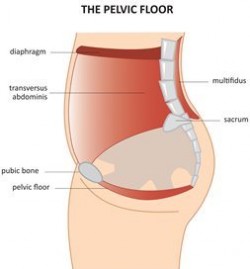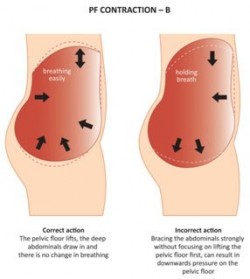
It’s a group of muscles and ligaments that support the internal organs, particularly the bladder, bowel, and if you’re a woman, the uterus. When the pelvic floor is strong it supports the pelvic organs and prevents problems like incontinence and prolapse (lack of support) of the bladder, uterus and bowel. These muscles also help you control bladder and bowel function so you can ‘hold on’ until an appropriate time, they also help with sexual function.
What causes pelvic floor weakness?
While weakened pelvic floor can happen to anyone, it is much more common in women. Some common causes of weak pelvic floor muscles include:
- Pregnancy and childbirth
- Being overweight
- Constipation
- Persistent heavy lifting
- Excessive coughing
- Hormonal changes in menopause
- Aging
Weak pelvic floor muscles can lead to embarrassing leaks when you laugh, cough, sneeze, or perform any kind of high impact jumping or skipping movements.
How can you strengthen your pelvic floor?
It is recommended that women in particular, exercise pelvic floor muscles every day. Weak muscles can be strengthened over time in order to work more effectively, this can reduce incontinence, help support the weight of a growing baby during pregnancy, speed recovery from childbirth, and increase sexual function. It can be a little bit embarrassing to talk about, but it’s important to know what to do to engage your pelvic floor:
Pelvic floor contractions
Imagine the muscles you would tighten to ‘hold on’ and stop yourself passing urine. Once you can feel your muscles working, tighten the muscles around your front and back passage as strongly as possible. You should feel the muscles lift up as you contract, and let go as you relax.
You can train for endurance by holding the contraction for 5-10 seconds and then relaxing, and you can train for power by repeating quick, strong squeezes without holding. These can be repeated several times a day. A good way to remember to do them is every time you stop at a red light – do them right there. The best thing about these, is you can do them anytime, anywhere, and no one will even know you’re doing them!
How can you prevent damage?
To reduce damaging and weakening your pelvic floor try to avoid:
- Gaining too much weight
- Constipation and straining with bowel movements
- Persistent heavy lifting
- Excessive coughing
Try to make sure your pelvic floor is activated any time you cough or sneeze. Include other regular forms of exercise like walking to assist with ongoing strength improvements.

